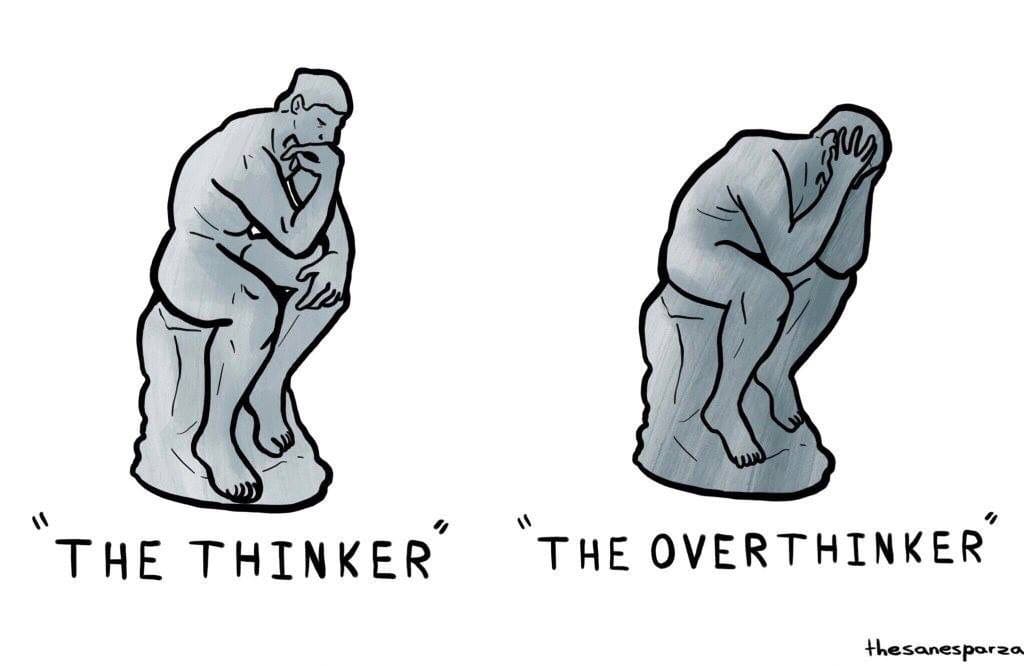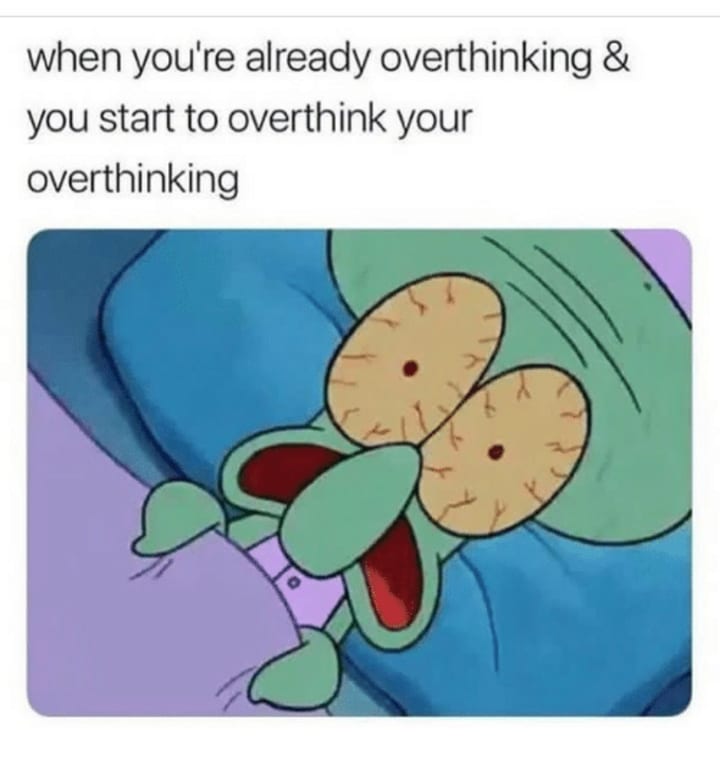The Over-thinker
Hello and welcome to my Ted Talk about overthinking.

Hello and welcome to my Ted Talk about Overthinking. For those that know me, know that I like to over-complicate everything. To overthink or think too much. I'm a very visual person so I imagine that when I overthink, it's like that game I used to play as I a child, in which there's a pole that's connected to a string that has a tennis ball on it that you hit and watch as the tennis ball goes around and around and around until the next person hits it. I like to picture that when I overthink, I'm the tennis ball flying through the air, not knowing how to stop but desperately yearning to be beside the pole once more.
A prime, and very relevant, example of me over-thinking are instances in high school and in my tertiary studies, when I've turned a fairly straightforward assignment into a critical, discursive analysis because I doubted the simplicity of the assignment I had to complete. On the plus side, this meant that I had already developed a fond understanding and knowledge of sociological theories but on the down side, I'd developed those critical understandings because my brain had spiralled out of control. Another example is what my brain tends to do in the pause between texts messages, or when someone has 'seen' the message but hasn't hit send. It's when I type, delete, re-type, delete and finally send a message.

Overthinking doesn't have many positives.The time that I spend over-thinking wastes energy and prevents me from making progress on whatever task I was set on completing. Instead of looking for a solution for what I foresee to be a problem, I'm trapped in this thinking bubble asking questions like 'what if', 'why' and 'how'. This leads to the inevitable negative thinking patterns in which I scrutinise my lived experiences and future experiences with a problematic mindset, questioning whether things were actually real or whether they'll work out. These experiences include those of my day-to-day and all of my interactions with people this past week as well as every other week before that. I mostly do this in the middle of the night before I go to bed. My brain creates unrealistic, imaginary scenarios and I believe them.
Overthinking makes me doubt myself and second guess everything. It makes me second guess how I'd approach a problem, a conversation or an everyday chore. It makes me second guess whether the phrase I've written makes sense or whether I've conjugated a verb in Hungarian instead of in English. It makes me see everything I've done as a potential mistake and it makes me re-do that specific task over and over and over again, until my brain gets tired of it all, I turn the laptop off and go to sleep.
Needless to say, it's exhausting and I wouldn't wish it for anyone. I'm often feeling physically and emotionally drained and all I want to do is have a hot bath and go to sleep.

So how do I/we make this critical voice stop playing tricks on me/us?
Clinical psychologist Natalie Pittman suggests that we replace the thought through conjuring up an image of something else. For example, if someone tells me to stop thinking about Foucault's theorem of Governmentality, then I'm still going to think about Foucault's theorem of Governmentality. So if I don't want to think about that theorem anymore, I need to conjure about an image or thought about something else, like the Post-structuralist Logics Approach. The moral is, that I'm thinking of something new. If I was thinking about rainbows, I could conjure an image of a storm and thus, I would start thinking and forget thinking about the rainbows. Although, that depressing analogy wasn't the best one to use.
Psychology professor Bruce Hubbard recommends that we cultivate a little psychological distance by generating other interpretations of the situation we're over-analysing, which might make our negative thoughts less believable, known as cognitive restructuring. This process involves us asking ourselves what the probability that what you're scared about or overthinking will actually happen? And if the probability for it happening is low, then what are the more likely outcomes? By doing this, you're rephrasing the problem you're ruminating about to reflect the positive outcome that you're looking for.
Another technique is finding a constructive ways to process your worries, anxieties or negative thoughts. I do this by writing in my journal whenever I feel overwhelmed and doing what I like to call a 'brain dump'. Although, in my brain dumps I use lots of figurative language and metaphors because I'm a poet at heart. This normally brings me a release of tension and helps me focus more on my task at hand.

According to psychologist Honey-Langcaster James, you can also control your over-thinking habits by connecting with your senses and, hence reconnecting with your immediate world. When you begin to notice the sensory elements around you, you spend less time in your head and are more in the present.
These techniques are helping me notice my overthinking habit and becoming self-aware of the things I do when I'm in this state. This is so that I can try and limit the times when I feel trapped inside my head and feel like that spinning tennis ball. You might even say that I'm writing this article as a distraction from me over-thinking something or critically thinking about someone by redirecting my thoughts to this article. If you thought that, then you would be correct. Please accept your virtual gold star.
The moral of the story is, stopping ourselves from over-thinking is impossible. We all do it just in varying degrees. But what we can do, is acknowledge what is happening and try applying some techniques to help manage what we are feeling so that we can return to do the task at hand without endless thoughts spinning in our minds.
My name is Virag Dombay. Thanks for coming to my Ted Talk.
VIRAG DOMBAY
Instagram: @virag_dombay
Facebook: www.facebook.com/viragdombayartist
YouTube: @viragdombay






Comments
There are no comments for this story
Be the first to respond and start the conversation.